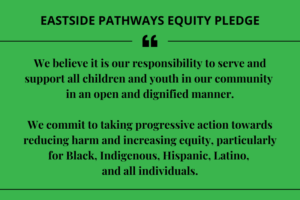Racial Equity: Eastside Pathways provides a framework for progress
It has been over two years since the deaths of Breonna Taylor and George Floyd amplified America’s awareness of the systemic inequities endured by people of color and historically disempowered communities. Across the globe, organizations, community groups, service providers, civic and governmental entities, and individuals likely had internal conversations like this:
- Racial equity is important. I/we would like to know more about how racial equity can be incorporated into the work I/we do and our surrounding culture.
- What do I/we need to change? How can I/we do it?
- Is anyone else thinking about this? HOW are they thinking about it?
 To translate those conversations into action, Eastside Pathways took steps to weave racial equity into the collective consciousness of the Partnership, while also promoting it within the scope of participating organizations, and supporting the people involved in the work. This multi-stranded approach is consistent with nationally based best practices for results towards social impact.
To translate those conversations into action, Eastside Pathways took steps to weave racial equity into the collective consciousness of the Partnership, while also promoting it within the scope of participating organizations, and supporting the people involved in the work. This multi-stranded approach is consistent with nationally based best practices for results towards social impact.
Setting up for system level change: starting with shared language
Since its founding, the Eastside Pathways Backbone has held the unique responsibility of creating a safe place for individuals and organizational stakeholders to voice ideas and test the local waters for readiness for cultural and systems change. In 2014, the Partnership began participating in Courageous Conversation to develop a foundational understanding of racial equity so that it would more clearly see the opportunities for improvement.
 “There was no community-wide practice at the time,” recalls Eastside Pathways Executive Director Stephanie Cherrington. “We started small because we knew we would not be able to address gaps in education and outcomes if we did not put racial equity at the forefront. Our strategy was to build the momentum for racial equity in the community as we built our own organization’s capacity to support it.” Through these first steps, the Partnership developed a shared language on the topic of racism as a social construct, and thus enabled the dialogues necessary for progress.
“There was no community-wide practice at the time,” recalls Eastside Pathways Executive Director Stephanie Cherrington. “We started small because we knew we would not be able to address gaps in education and outcomes if we did not put racial equity at the forefront. Our strategy was to build the momentum for racial equity in the community as we built our own organization’s capacity to support it.” Through these first steps, the Partnership developed a shared language on the topic of racism as a social construct, and thus enabled the dialogues necessary for progress.
By 2019, the Partnership made the formal commitment to place racial equity at the center of its collective work and established a Racial Equity Council to guide and assure accountability for those goals. The commitment was a public affirmation that Partners were in the journey towards systemic change – no matter how incremental – together. “Eastside Pathways started with its new strategic plan years before the pandemic and the George Floyd social justice movement,” says longtime Community Partner Chris Enslein. “It put the organization in a great space to tackle the challenges that presented the world in 2020.”
Respecting organizational differences and readiness for change
 At that moment of national reckoning, the Eastside Pathways Backbone convened Partners to examine the influence of race in how they serve youth across sectors and of different ages/stages. The resulting Eastside Pathways Equity Pledge (EPEP) became a baseline script for changemakers to have “conversations about race and commit to taking action toward reducing harm and increasing equity,” and then to create change within the scope of their own organization and role. Individual Partners who signed the EPEP were then invited to join the Racial Equity Collaborative Action Network (CAN), which Eastside Pathways launched in early 2022.
At that moment of national reckoning, the Eastside Pathways Backbone convened Partners to examine the influence of race in how they serve youth across sectors and of different ages/stages. The resulting Eastside Pathways Equity Pledge (EPEP) became a baseline script for changemakers to have “conversations about race and commit to taking action toward reducing harm and increasing equity,” and then to create change within the scope of their own organization and role. Individual Partners who signed the EPEP were then invited to join the Racial Equity Collaborative Action Network (CAN), which Eastside Pathways launched in early 2022.
Danny Cage Jr, a District Director at the YMCA of Greater Seattle has been ‘doing DEI’ (diversity, equity, and inclusion) for most of his career. Even so, the benefit of this new group was immediately apparent: “The CAN provides a place to have important conversations, feel seen, and voice frustrations with others outside my organization. It’s different from just ‘doing DEI’ at work, but just as essential because I know we’re contributing to the ripples in the whole region.”
Scarleth Lever Ortiz experienced another benefit: when she moved to the Seattle region last year to become Senior Director of Equity, Diversity, and Inclusion at the King County Housing Authority, she brought a wealth of program experience gained in Chicago. Joining the CAN with other KCHA staff “allowed me to better understand issues in the Pacific Northwest and gave us confidence that our work to assure that access to housing – so fundamental to a family’s safety – would be delivered with cultural competence.”
Attending to changemakers as persons
Though the work of social change can be motivating and gratifying, it can also be draining. In the spring of 2020, the coincidence of the racial justice movement and the pandemic made it especially critical to address the very real stress experienced by people involved in the work of social change. “Who you are as a person influences how you exercise leadership in your role,” says Eastside Pathways Impact Manager Kalika Curry. “Black and Latine folks often feel burdened being the ‘resident POC’ in an organization! We needed a way to alleviate their racial isolation and simply see how people are doing.”
 Eastside Pathways launched monthly gatherings of POC Only and White Affinity groups, where those involved can confidentially share the at-times personal challenges related to brokering the social shift. “I have learned how some of the influences I have had all my life have led to characteristics of White Supremacy Culture in my life,” says one participant. “I’m personally trying to learn new ways of adaptive thinking and being, so I can better contribute to overall solutions.”
Eastside Pathways launched monthly gatherings of POC Only and White Affinity groups, where those involved can confidentially share the at-times personal challenges related to brokering the social shift. “I have learned how some of the influences I have had all my life have led to characteristics of White Supremacy Culture in my life,” says one participant. “I’m personally trying to learn new ways of adaptive thinking and being, so I can better contribute to overall solutions.”
What’s next?
It has never been easy to make intentional change that lasts. “We started by opening the conversation about racial equity and how it affects youth across the developmental spectrum,” says Cherrington. “Now racial equity and culturally relevant practices are integral to how we facilitate the work. Partners know where they each stand and where they can find resources, support, and collaborators.” Furthermore, Eastside Pathways has pledged to ensure that data used to drive Partnership actions and decision-making will center the experiences and needs of youth and families of color in an asset-based way.
Eastside Pathways added two additional recent opportunities for Partners to learn and incorporate racial equity into their work. The Equity in Communications group was formed to encourage Partners to consider linguistic and cultural preferences in how they reach parents with information critical to support children through their development. And the Wisdom Series was launched as a monthly book/film series to elevate thought leaders of color as mentors into the cultural dialogue.
Sudeshna Dixit, Director of Cultural Connections at EastHub, appreciates the progress. “I think Eastside Pathways is one of the few organizations that follows through from talk to action. Their guidelines, action plans, and meetings facilitate great connections and conversations that have helped me figure out my personal journey as well as all the things I can implement at my organization to be more attentive and equitable.”
With attention to the roles and people involved, Eastside Pathways Partners find the work of racial equity to be a little less daunting, and hopefully a lot more enduring.

